Our thoughts define our actions.
Our actions define our success.
So how do successful people think?
To answer that question, I put together 101 powerful life lessons that will make you more successful.
The truth is:
The internet is full of tactics, techniques, and how-tos. And sometimes, the right tactic can pay off…
But let’s take a step back.
We all have the same tools available.
So the question is:
What TRULY separates those who succeed from those who fail?
The answer is:
It’s the way successful people THINK.
That’s why I put together this list.
Because when you start to think like successful people think… you start to act like successful people act.
Now…
This is a LONG list.
So, I put everything in 5 different groups:
- How successful people think about work and business
- How successful people think about reaching their goals
- How successful people think about being more productive
- How successful people think about dealing with other people
- How successful people think about living life to the fullest
Now…
Some items might fit in more than one category.
Here’s the best way to read this article:
Scroll through the whole list.
Stop if something catches your eye.
Then scroll on.
And of course, you can always come back to it (I think you’ll find useful insights the second and third time around as well).
You’ll also find an overview of all 101 lessons in the form of an infographic. If you get something out of this post, please share it.
With that said…

Major key alert — 🔑🔑🔑
Are you ready for some major keys?
Let’s start with…
Part 1: How Successful People Think About Work and Business
Success isn’t just about work.
But let’s be real:
When we say “successful” we mean things like…
- Running a successful business
- Getting your dream job
- Being able to do what you love AND pay the bills
So how do some of the most successful people think about work and business?
#1 – Competition as a GOOD thing
When people start new businesses, they always think they need to do something no one’s ever done.
That may work sometimes. Most of the time, when no one’s selling what you’re trying to sell it means: no one wants to buy it.
That’s why competition is a GOOD thing.
It means people are willing to pay for what you want to sell. And it pushes you to do better.
#2 – To Sell Is Human
In “To Sell Is Human” Dan Pink writes:
“We’re all in sales now.”
It’s true. It doesn’t have to say “sales” in your job title. You’re still a sales-person. That is, you’re in the business of persuading, influencing, and convincing others:
“Physicians sell patients on a remedy. Lawyers sell juries on a verdict. Teachers sell students on the value of paying attention in class.”
Selling is literally the one skill you can get good at and you’ll never go hungry:
#3 – There Are No Magic Bullets
Sometimes we hope for magic solutions that will solve all our problems. “If I just do this one thing… my business will be saved” or “…my life will be perfect.”
Successful people know that’s not how it works. There are no “magic bullets.” Or as billionaire investor Marc Andreessen puts it:
There are no silver bullets. There are only lead bullets.
Jim Collins and Jerry Porras describe the same idea in Built to Last. Long-lasting business success is like a work of art:
You can’t point to any one single item that makes the whole thing work; it’s the entire work—all the pieces working together to create an overall effect—that leads to enduring greatness.”
When you look for magic bullets, you’ll be looking forever because they don’t exist. Instead just do the work and fire many lead bullets.
#4 – “Be Fearful When Others Are Greedy and Greedy When Others Are Fearful”
Warren Buffett is one of the richest people in the world.
In a 2008 interview he said:
You want to be greedy when others are fearful. You want to be fearful when others are greedy. It’s that simple.
This is mostly seen as investment advice, but I believe it applies more broadly, too.
#5 – Zig When Others Zag
A more general version of Mindset #4:
Zig when others zag.
I’ll explain…
You may know The Roots as Jimmy Fallon’s house band. But the group has been around for much longer. And they’ve always been unique in one important way…
You see, when Rap music started, most artists used music from records that already existed. The rappers just added the lyrics. And it’s still like this today. Much of Rap music isn’t created by playing an instrument in the traditional sense.
But the Roots were always different. They’re a rap group. But they’re also a full band, playing original music. This is a perfect example of “zigging when everyone else is zagging.”
The band even made a song about it. It’s called “What They Do:”
This is how successful people think: They zig when others zag.
#6 – “If it’s not a hit, switch”
Derek Sivers is the founder of CD Baby, which he sold for $22 million. The big lesson he learned was this:
If you try and try and try to do something that just doesn’t work… it’s time to switch:
We’ve all heard about the importance of persistence. But I had misunderstood. Success comes from persistently improving and inventing, not from persistently doing what’s not working.
I know this first-hand, too. I tried other businesses before I started Social Triggers. They didn’t work out. So I switched. Then, Social Triggers was a hit.
Notice, he doesn’t say “quit.” He says “switch.” Try something else. Otherwise, you’ll burn out faster than you think.
#7 – Double-Down On What Works
Too often I see people do the opposite…
The find something that works (awesome!) and then they switch.
WHY??
Instead what you should do is DOUBLE DOWN.
Call it persistence. Call it Stick-to-it-ness. Rise to the Top founder David Siteman Garland calls it “Entrepreneurial ADD:”
Entrepreneurial ADD is real my friend. And it is deadly. When my most successful students and customers find something that works…they stick to it. They double and triple down.
I personally call it “shiny object syndrome.” And you need to avoid it like the plague.
#8 – Move Swift…
Most successful people are at least a little bit reckless…
Aka they trust their gut… and act FAST.
I talked about this with Adam Braun on the Social Triggers Insider podcast. When Adam got the idea for Pencils of Promise, he got started by depositing $25 into a bank account.
He didn’t think about it more. He just got started.
Just like John C. Maxwell writes in How Successful People Think:
Ideas have a short shelf life. You must act on them before the expiration date.
Money and business love speed. That’s why successful people act fast. If they’re wrong, that’s how they learn. If they’re right, that’s how they win.
#9 – …But Be Patient
Sounds like a contradiction but it’s not.
I’ll explain.
While successful people act fast in the moment, they’re also patient in the long-term.
In the words of Gary Vaynerchuk:
Macro patience, micro speed.
Every overnight success is years in the making, as they say.
Successful people know this. They execute fast in the day-to-day. But they’re more patient than most in the long-term. That’s why they’re able to reach big goals – even when everyone else thinks they’re crazy.
#10 – Micro Pain Vs. Macro Fun
Let’s say you find your dream job. Or you run your own, profitable business.
Awesome, right?
Absolutely. I love my business.
But that doesn’t mean it’s all fun all the time.
In fact, a lot of the time it’s a pain in the *ss. To be successful you need to do the stuff that’s NOT fun. Because that’s where most people quit. But it’s also where the money’s made.
I made an accurate drawing here:

Where the Money Is Made (by Derek Halpern)
Gary Vaynerchuk talks about the same idea here – micro pain VS. macro fun:
#MondayMotivation pic.twitter.com/oRDTqfriJZ
— Gary Vaynerchuk (@garyvee) January 29, 2018
#11 – Don’t Listen to What People Say… Watch What They Do
Especially, don’t believe anyone who tells you they know what they’re doing.
Vitalik Buterin, co-founder of Ethereum, explains this in a brilliant quote in Tribe of Mentors:
A common rookie error that inexperienced leaders make is always agreeing with the last person they talked to; this takes a while to get past, though it becomes easy once you get exposed to enough people who contradict each other. A good general strategy is reasoning counterfactually: if someone tells you that X is true, ask yourself—( i) what would they say if X really is true, and (ii) what would they say if X is false? If the answer to (i) and (ii) is “they will say roughly what they just said now,” then their words provided you with exactly zero information. In general, know when it’s really important not to take people’s words at 100 percent face value.”
Look, the only thing higher than Vitalik’s net worth is his IQ…
What he’s saying is (I think):
People have all kinds of motives. They may want to mislead you on purpose. Or they may be fooling themselves.
So, rather than listening to what people say… watch what they do. Draw your conclusions from people’s actions, not their words.
#12 – No “Free Lunch”
I once got scammed on the internet. I sent someone money for a deal that was too good to be true… and it was.
I learned my lesson.
Today, I know: There’s no free lunch.
In fact, everything comes with a price. Even when you get something for free, it usually means you’ll be paying for it later – in one way or another.
#13 – Never Put All Your Eggs in One Basket
Successful entrepreneurs understand risk better than most people. They take risks and reap big rewards when a business idea succeeds. They also know that, out of 10 ideas, most will fail.
That’s why successful people diversify. Aka they don’t put all of their eggs in one basket…
They don’t rely on a single stream of income. They diversify their portfolio. They don’t rely on a single platform… they build their own.
#14 – Trust Your Gut
When your gut tells you no, don’t say yes:
#15 – Be Unpredictable
Imagine you’re playing Rock, Paper, Scissors…
Now imagine what would happen if you always played “Rock.”
You’d be a very easy opponent to beat!
This example shows that unpredictability is important for success in some situations. In fact, in the Rock, Paper, Scissors example, the optimal way to play is to choose randomly:
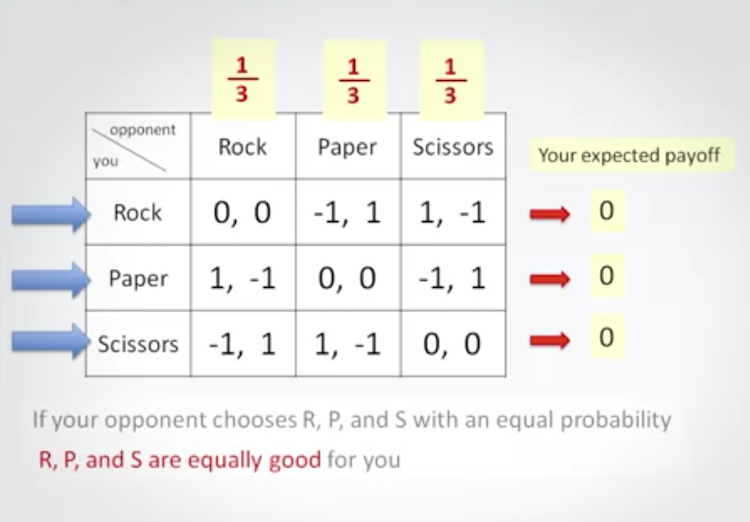
How to win at Rock, Paper, Scissors
This applies to many other situations, too…
Think boxing, complex negotiations, or any other time you’re facing a direct opponent. Unpredictability is powerful In all of those situations because there’s no defense for it.
But be careful…
Don’t confuse unpredictability with being unreliable. If you want people to work WITH you, being unpredictable is pretty frustrating.
#16 – No One Cares About Your Ideas
Most people constantly worry about what other people think.
It’s funny, too. People think someone will a) either LAUGH at their ideas or b) STEAL their ideas.
The truth?
Most people couldn’t care less about your ideas.
For TWO reasons…
Reason #1:
People don’t care about your ideas until you show them how it will make THEIR life better.
In Sales Page that Converts I teach people about this concept I call “No one wants to buy your sh*t.” Then I show them how to position a pr: duct people actually want to buy.
(I got ide from Steven Pressfield, who wrote “Nobody Wants to Read Your Sh*t.”)
Reason #2:
Ideas alone aren’t worth much. You need “implementation” ideas, too. Aka, how are you going to make your idea happen?
There are countless stories of people with great ideas that never turned into reality. For example…
I remember reading a story about Isaac Asimov, the science fiction author. People would frequently contact him with story ideas.
Then they’d suggest:
You write the story and we split the profits.
His response was always the same:
How about we do it the other way around? I give you the idea, you write it, and send me 50% of the profits.
Or take one of my uncles…
He used to always brag about how he invented rollerblades. Of course, he didn’t. I share the whole story here:
#17 – You Get What You Pay For
You won’t believe what Mark Cuban did with the money from selling his first company…
He spent $125,000 for an American Airlines lifetime travel pass. He could get on any plane, any time, even it it’s full.
Some people may think that’s crazy.
But at the time, all Cuban wanted to do was travel and party. And he had the money. So he bought a lifetime pass that would allow him to do what he wanted.
I didn’t buy a lifetime travel pass, but…
When I spent $25,000 on a new web design people thought I was crazy, too. And they were quick to judge. But I knew what I wanted. And I knew it wouldn’t be cheap.
Successful people know what they want. And they’re willing to pay for it.
That’s why I think it’s a terrible idea to be a cheapskate…
#18 – Always Have More Than One Option
Successful people are like Switzerland:
They stay neutral.
They don’t get involved with anyone else’s conflicts.
They don’t burn any bridges.
They keep their options open.
That’s how they stay adaptable and flexible.
As a result, they can act fast when opportunity strikes.
#19 – Ambition Is Nothing to Be Ashamed Of
It’s weird how ambition sometimes gets a bad rap.
My friend Ramit talks about it in this video:
#20 Celebrate Small Wins
If you’re reading this, you probably have big goals…
I want to make $10,000 a month
I want to write a book
I want to run my own yoga studio
Awesome!
Successful people set big goals – that’s how they become successful.
HOWEVER…
They celebrate the small wins along the way:
Let’s say you want to write a book. Celebrate every chapter your finish! Heck, celebrate every page and every paragraph.
Just like making $X amount. You start by making a fraction of X. Then you make a little more. And a little more. Before you know it, you’ve reached your goal number.
The problem is, if you delay gratification until the end, you might not make it…
When I realized I’d created a successful business with awesome students, I just kept growing. In some ways, I regret that. I should have taken a second to celebrate the accomplishment. In fact, I should have made it a regular priority! Now I do. – Ramit Sethi
The small wins are what will keep you going.
That’s why successful people celebrate every step forward.
Part 2: How Successful People Think About Reaching Their Goals
Remember, you can also see all the lessons in this infographic. If you like these lessons, please share it!
What does it take to reach your goals?
Wherever it is you want to go…
…here are the success-mindsets that will help you get there.
#21 – Climb the Right Ladder
Do you want your boss’s job? If the answer is “no,” you should ask yourself whether you’re climbing the RIGHT ladder?
Robert Greene writes in his book Mastery:
A false path in life is generally something we’re attracted to for the wrong reasons – money, fame attention, and so on.
Successful people ask themselves “Why am I choosing this path?” When they realize they’re going down the wrong path – or climbing the wrong ladder – they change course.
#22 – Cut the Line
Steven Spielberg’s dad told him:
If you want to make it in the movie business, you have to start as a gofer and work your way up.
But Spielberg skipped the “work your way up” part. He was the director on the first movie he worked on.
You see, in life there’s always more than one path that leads to success. Specifically, there’s the path everyone takes… and then there’s the OTHER paths.
Often, when you don’t follow the “normal” path you can cut the line – just like Steven Spielberg did.
#23 – Accept New Challenges
Whenever things get more difficult, successful people don’t complain. Instead, they realize that they just “leveled up.”
For example, think back to the last time you started a new job. I bet it was exciting. But I also bet it was more difficult than your previous job.
At least in the beginning… You had to prove yourself to the new team. You have more responsibility. You have to learn new skills. But what happens after a couple of months?
You get better. What used to be a new challenge is now routine. It was only difficult because you leveled up.

Congrats, you just leveled up!
Let me give you another example…
When I wrote my first blog post, it was a challenge. I could barely finish an article. But writing is much easier for me today. Why? Because I’ve written hundreds of blog posts, video scripts, and sales pages.
Successful people accept new challenges. That’s how they make it to the next level.
#24 – Think BIG
At the age of 30, writer John Perry Barlow wrote down 25 principles of adult behavior. This one stuck out to me:
Expand your sense of the possible.
Why? Because when you shoot for the stars, even if you miss, the result will be better than when you aim too low.
“If you think something hard is impossible, you’ll never even start trying to achieve it.” Peter Thiel
That’s why successful people think BIG.
#25 – Be Stubborn
Here’s one of my favorite quotes from Amazon founder Jeff Bezos. He often says:
Be stubborn on the vision and strategy and flexible on the details and tactics.
To illustrate…
When I wrote about how to reach your big goals, I shared a story about movie director Marc Forster. He turned down a $500,000 offer early in his career because it didn’t fit in with his vision – and everyone called him crazy.
But why is it so important to have a “vision?
Because without it, you don’t know which direction to go.
HOW you get there is a different question…
If you’re flexible on the tactics, you’ll figure it out.
But if you don’t know where you’re heading in the first place, it’s going to be a long way to success.
So take it from Jeff Bezos: Be stubborn on the vision but flexible on the tactics.
#26 – “I’m going to die on this treadmill”
Will Smith apparently made over $100 million from Men in Black 3. This guy is truly an inspiration. So what’s his secret to success?
He’s willing to outwork you… and everyone else:
“I will not be outworked, period. You might have more talent than me, you might be smarter than me, you might be sexier than me (…) But if we get on the treadmill together, there’s two things: you’re getting off first or I’m going to die. It’s really that simple.”
#27 – True Greatness Comes from Mastering the Basics
Boxing champ Liz Q. Parr has won 4 US Nationals gold medals. You probably don’t want to mess with her…
What does she say about becoming great at anything?
You can learn all the fancy pretend sh*t you want but keeping your hands up, feet moving, and a good jab is GOLD.
This explains why the most successful people always make it LOOK EASY when they do what they do…
Think of Prince playing the guitar. Or Michael Jordan playing basketball. Or Elon Musk building billion dollar companies.
…but the only reason they can make it look easy is that they’ve mastered the basics.
#28 – Make It Work, No Matter the Circumstances
Self-made billionaire John Paul DeJoria is the co-founder of the Paul Mitchell line of hair products and Patrón tequila.
What people don’t realize is what he had to go through before starting those companies:
When he started the Paul Mitchell brand, he had just gone through a grueling divorce. And he was completely broke. In fact, he was living out of his car after he moved out. So, I’m not talking “not a lot of money” broke. I’m talking “homeless” broke…
So he went door to door, from beauty salon to beauty salon.
He made it work.
Or take one of my star-students, Lisa:
She wrote a sales page that made $21,861 in 4 months. The best part? She did it while she was 9 months pregnant.
She didn’t make excuses…
She made it work.
Because that’s what successful people do.
#29 – Turn Fear Into Ambition
Are successful people immune to the fear of failure?
Heck no!
The difference is… They don’t let their fear paralyze them. Instead, they turn their fear into ambition.
Shark Tank entrepreneur Barbara Corcoran looks for this trait in people:
Many entrepreneurs judged as ambitious are really insecure underneath (…) I want someone who is scared to death.
#30 – Stop Worrying
Peter Gruber, the chairman and CEO of Mandalay Entertainment Group told Tim Ferris in Tribe of Mentors:
The great majority of that which gives you angst never happens, so you must evict it. Don’t let it live rent-free in your brain.
That’s why people that worry less are more successful. If your brain power gets drained by constant worry, you’ve got nothing left for the real issues.
It leads to entrepreneurial burnout – or worse…
“Business men who do not know how to fight worry die young.” Alexis Carrel (French physician and Nobel Prize winner)
#31 – Ego Is the Enemy
Jessica Alba, the actress who now runs The Honest Company recently said in an interview:
It’s important to surround yourself with people smarter than you and to listen to ideas that aren’t yours.
Her quote reminds me of a great scene from House of Cards…
A new speechwriter joins the President’s team. He makes some revisions to a speech, and a staffer complains to the new guy:
“You changed everything we wrote.”
His response?
“Do you want it to be good or do you want it to be yours?”
Harsh but… true.
When you’re committed to success, it doesn’t matter whose idea it is. There’s no room for Ego. What matters is that the best ideas win.
#32 – Keep Calm and Carry On
Did you know that THIS…
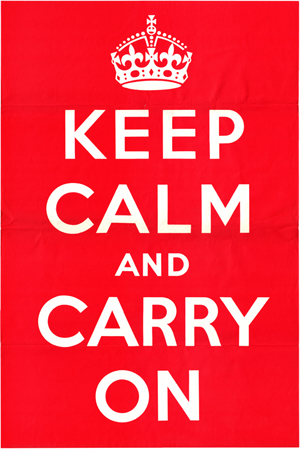
“Keep calm and carry on.”
…was originally a motivational poster by the British government?
It first appeared in 1939. It was good advice then… and it’s good advice now: In the face of adversity it’s important to stay calm.
It’s funny, too…
Because some people take pride in how hectic their life is. Other people, like Basecamp co-founder David Heinemeier Hansson, think “calm” beats “hectic”:
Make 2018 the year you decide to get calm. Stop smiling when you say "it's crazy at work". It doesn't have to be, and it's better when it's not.
— DHH (@dhh) January 2, 2018
Successful people keep calm under pressure (and carry on).
#33 Don’t Be a Know-it-all
They say you should “never be the smartest person in the room.”
I believe it’s true. Why? Because you probably don’t know as much as you think you do.
It actually makes you look stupid when you act like you know everything:
If you wish to improve, be content to appear clueless or stupid in extraneous matters—don’t wish to seem knowledgeable. And if some regard you as important, distrust yourself.” — Epictetus
The most successful don’t claim to know it all. So, if you want to succeed, don’t be a know it all. Instead…
#34 – Be a Learn-it-all!
…be a learn-it-all.
Or as best-selling author Neil Strauss once put it:
Learn more, know less.
Successful people are never satisfied with what they already know. They want to learn more. That’s why they read more, travel more, and meet more new people.
It seems like everyone agrees: Being a lifelong learner is… *major key alert* …crucial for success.
#35 – When You’re Stuck, Ask for Help
Okay, this is slightly painful to talk about. But I’ll tell you anyway…
I once wasted $100,000 because I didn’t ask for help.
The worst part?
ONE phone call could have saved me from wasting all that money.
Today this reminds me that it’s important to ask for help whenever I’m stuck.
It’s weird, too…
Athletes and other high-performers hire coaches all the time. Yet, in many other areas of life it’s looked down upon to ask for help. Think business, relationships, mental health. But the same rules apply in those areas…
In his TED Talk, Atul Gawande talks about why having a coach and asking for help is so important:
- You get a more accurate picture of your real skill level.
- You learn about the right way to think about a topic.
- You can drill the right habits and improve faster.
So, if you want to get better – quickly – you need a coach. And you need to ask for help when you’re stuck.
#36 – Shut Up And Listen
Successful people know it’s crucial to put their ideas out into the world. However…
They also know that there’s a time to shut up and listen.
This may be surprising to some. Aren’t successful people supposed to be loud and outspoken?
Yes and no…
Take Steve Jobs for example. Everyone knows he was kind of a pain to work with. But he also had a trusted group of advisors, like Jonathan Ive (Apple’s Chief Design Officer).
And Richard Branson even says listening is one of his most important leadership principles:
Listening enables us to learn from each other, from the marketplace, and from the mistake that must be made in order to get anywhere that is original and disruptive.
You can’t find a good story if you’re the one who’s doing all the talking. That’s why successful people know how to shut up and listen.
(Oh, and you should eavesdrop on your customers, too.)
#37 Single Outcomes Are Not Guaranteed
Only my good friends know (well, until now) that I used to play poker for a living.
Poker is a fascinating game. It’s a unique mix of luck and skill. You can play terribly and still win. You can make the perfect play… and still lose.
That’s why I love this quote from Peter Bevelin:
After a success, we become overly optimistic risk takers. After a failure, we become overly pessimistic and risk-averse – even in cases where success or failure was merely a matter of chance. Good consequences don’t necessarily mean we made a good decision.
In that way, poker is a lot like business. Or as Ben Horowitz of the venture capital firm Andreessen Horowitz writes:
Successful startups are a combination of ingenuity, hard work, and luck.
In short: success is never guaranteed.
HOWEVER…
This is only true in the short run. Over time, those who make better decisions WILL win.
#38 – Always Play the Odds
In the long run, playing the odds always pans out.
Smart people understand this. The problem is…
It’s much easier to understand than to live by.
Jeff Bezos makes this exact point here:
“If I said to you, you have a 10% chance of a 100x return, you should take that bet every time. But you’re still going to be wrong 9 out of 10 times and it’s going to feel bad 9 out of 10 times.”
So, the tricky part is not letting the outcome of a single event effect your decisions.
The good news is:
If you KNOW the odds are in your favor, you can…
#39 – Trust the Process
Whenever we learn or do something new the same thing happens. I’m sure you’ve experienced it, too:
At first it’s fun. You learn fast. You make progress quickly. But then…
You hit a wall.
Suddenly it gets harder to get better. And frustration sets in:
“I’m never going to figure this out!”
I remember I felt that way when I first learned to drive a stick-shift car… It was annoying, too. I was learning to drive at the same time my best friend did. And he seemed to be a “natural.” I was repeatedly killing the engine. But when he used the clutch, it was perfectly smooth.
My biggest problem? I couldn’t do the hill-start. But then, my mom helped me figure it out through a rigorous process…
First we practiced slowly engaging the clutch on even ground. Then she had me add the gas pedal to it. It wasn’t exactly exciting. But it was only the first step.
Next, we moved to a parking lot that had just the slightest incline. This made it much harder to put the car in gear without killing the engine. Of course, that’s what I did for the first 50 tries. But after a while, I wasn’t killing the engine anymore. It wasn’t exactly smooth… but at least I got it in gear. I kept practicing on the hill with minimal incline… until I was able to put the car in gear smoothly. That’s when we moved to the driveway with a much steeper incline…
And guess what happened! I went through the same process again. At first, I kept killing the engine. After I while I was able to get it in gear – with a big jolt. Finally, I mastered the hill-start, too.
Today, whenever I get frustrated with a new challenge, I remember this experience.
This is what it means to trust the process.
As Robert Greene writes in Mastery:
The difference is not simply a matter of determination, but more of trust and faith. Many of those who succeed in life have had the experience in their youth of having mastered some skill – a sport or game, a musical instrument, a foreign language and so on. (…) In moments of doubt in the present, the memory of the past experience rises to the surface. Filled with trust in the process, they trudge on well past the point at which others slow down or mentally quit.
#40 – What Got You Here Won’t Get You There
Success is about getting from HERE – where you are now – to THERE – where you want to be.
The problem is…
To get “there” you need to do something differently because What Got You Here Won’t Get You There. Marshall Goldsmith writes in this best-selling book:
“…we get positive reinforcement from our past successes, and, in a mental leap that’s easy to justify, we think that our past success is predictive of great things in out future.”
It’s the paradox of success: The beliefs and actions that brought you here, may be holding you back from getting there.
Goldsmith calls this the success delusion. Not because you shouldn’t be confident in yourself to achieve great things in the future. But because it can be a problem when we need to change.
This reminds me of Albert Einstein’s definition of insanity: doing the same thing over and over again but expecting a different outcome. Well, it ain’t gonna happen.
So, wherever you want to go, in order to get there, you can’t just keep doing what got you here.
Part 3: How Successful People Think About Being More Productive
Remember, you can also see all the lessons in this infographic. If you like these lessons, please share it!
What about productivity?
Here’s how successful people think about the topic…
#41 – Efficiency vs Effectiveness
Peter F. Drucker famously said:
There is surely nothing quite so useless as doing with great efficiency what should not be done at all.
To illustrate…
You could get really good at typing faster. Or you could get really good at writing sales copy. Only one of these activities will help you make more money.
This is also why I always tell people to “do things that don’t scale.” Especially in the early stages of their business.
For example, the Airbnb founders went door to door to find hosts, take pictures to get their app up and running. Airbnb is now worth about $30 billion. Kind of crazy, huh?
Yes, in a perfect world, you want to do the right things the right way. That is, you want to be effective AND efficient.
But if you have to choose, always choose effectiveness: Do the right thing, even if your approach isn’t efficient (yet).
#42 – Focus on High-Value Work
Yes, successful people are usually busy. But they don’t do “busy work.”
They focus their time and energy where it makes the biggest impact. If you’re running a business, this usually means doing only the things that lead to sizeable revenue.
This quote by John Bassett III sums it up best:
“Pay somebody else to do your emailing and Ipad-ing if it frees you up to do the heavy lifting of money making.”
Don’t stress if you can’t afford to pay someone right now. Just make sure you spend YOUR time where it leads to the biggest results.
And remember: Successful people are never busy just for the sake of being (or looking) busy.
#43 – Aim for Remarkable Results
Successful people don’t aim for perfection… but they strive for excellence.
Everything starts with doing good work and delivering excellent results.
If you want to be successful, be the exception.
HOWEVER…
#44 – Done is Better Than Perfect
Perfectionism kills any chance of success.
Because when you aim for perfection, you’ll never be DONE.
You’ll never publish that blog post. You’ll never launch your product. You’ll never release your ideas into the world.
That’s why “Done is Better Than Perfect.”
Mark Zuckerberg made this quote famous. Look, they even put up a poster at Facebook HQ in Palo Alto:
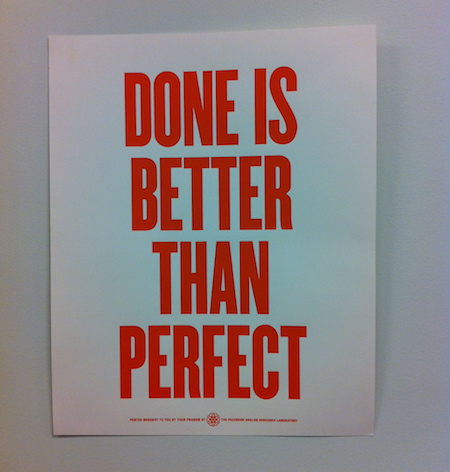
Done is better than perfect.
Successful people don’t aim for perfection.
They aim for excellence.
Most importantly, they get it DONE.
#45 – (Never Say) “I’m Doing the Best I Can”
“I’m doing the best I can” is one of the most limiting things you can tell yourself.
We say it when we fail to meet a standard.
Sometimes it’s other people’s standards.
But this mindset is most destructive when we fail to meet our OWN standard.
We use it as an excuse by telling ourselves, “Well, I did the best I could.”
Did you, though?
Successful people always try to do better.
But when you say “I’m doing the best I can” you put a ceiling on what you can achieve.
This is just one way in which negative self-talk makes you less successful…
#46 – “My Work is Valuable”
I used to talk disparagingly about my work…
“So Derek, what are you working on?”
“Oh, just some Social Triggers sh*t.”
…until my friend Noah pointed it out to me. I share the story in this video:
I don’t call my work “sh*t” anymore. You’ll be happier and more successful when you stop talking down on yourself.
#47 – Keep Your Calendar Empty
Show me someone’s calendar and I’ll show you their priorities.
People love to trumpet how busy they are…
…so they say yes to everything.
I found the opposite to be true:
When I started saying no, my productivity increased.
That’s why I keep my calendar empty. It gives me time to do my most valuable work. And to plot my next move.
As another example…
Take Brian Scudamore. He runs the $250 million O2E empire. Scudamore keeps all his Mondays EMPTY.
He got the idea from his father:
My father was one of the top surgeons in Canada, so when I was young I saw how surgeons aim to have maximum impact with minimum intervention. (…) accomplishing this is about careful planning. The actual surgery–the physical work–is only a small part of the process.
I approach business the same way. The Mondays I devote to thinking allow me to operate with surgical precision during the rest of the week.
The list of successful people who deliberately keep their calendar empty is long. To name one more…
Warren Buffett once said he spent 80% of his career reading and thinking.
#48 – Implementation Vs. Information
Yes, successful people are lifelong learners.
HOWEVER…
"Better to apply one book than to read 10." – @ramit
— Vanessa R. Williams (@NessaRWilliams) December 10, 2017
Learning only leads to success through implementation.
You can collect all the information in the world. That can be interesting in itself… But if you want to succeed, you must apply what you learn.
#49 – Plan All the Way to the End
Half-finished work is better than a raw idea… but it’s still pretty worthless.
That’s why successful people always keep their end goal in sight.
Robert Greene’s 29th Law of Power says:
Identify your goal and consider it all the time. Determine the potential problems, enemies, and detours you might encounter (…) You increase your chances of success by planning far ahead.
#50 – Get Used to Uncertainty
The world will end in 1999.
Or was it Nostradamus?
Oh wait.
We’re still here.
Phew!
My point is:
We can’t predict the future. The world is just too complex. Successful people know this – and they can handle the uncertainty. For example…
In How Successful People Think, John C. Maxwell writes:
Creative people don’t feel the need to stamp out uncertainty. They see all kinds of inconsistencies and gaps in life, and they often take delight in exploring those gaps—or in using their imagination to fill them in.
And as J. Paul Getty once said, it wouldn’t be much fun, either…
Without the element of uncertainty, the bringing off of even, the greatest business triumph would be dull, routine, and eminently unsatisfying.
#51 – It’s Normal to Feel Doubt
Along with uncertainty comes the feeling of doubt.
Are successful people free of doubt?
No…
They just don’t let doubt lead them to irrational decisions. English poet John Keats called it “Negative Capability”:
“I mean Negative Capability, that is when man is capable of being in uncertainties, Mysteries, doubts, without any irritable reaching after fact & reason”
Uncertainty is a given. And feelings of doubt are normal. But how do the most successful people overcome doubt?
NOT by “thinking” about the problem…
#52 – Action Leads to Clarity
My friend Marie Forleo once told me:
Clarity doesn’t come from thought. It comes from action.
Barbara Corcoran – you probably know her from Shark Tank – agrees with Marie:
“I hate entrepreneurs with beautiful business plans (…) invent as [you] go.”
When you’re confused or unclear about the next steps, you have two choices: You can think about it. Or you can take the first step.
"It's more important to do things than to brood over them." Hiroshi Arakawa
— Ryan Holiday (@RyanHoliday) February 13, 2018
Successful people don’t miraculously know the best course of action. They don’t always make the correct decisions. But they take the first step and gain clarity that way.
#53 – Start Before You’re Ready
Fear of failure is one of the biggest obstacles that’s holding people back.
I talked about this on my podcast with Tim Ferriss.
The problem is:
When you’re so afraid to fail before you try… you never start. That’s the exact OPPOSITE of how successful people think.
To quote Amy Poehler:
Great people do things before they are ready.
So, next time you catch yourself making excuses like…
“But I have no money”
“I don’t know anyone”
“I don’t have the experience”
…remember that it’s best to start before you’re ready.
And don’t you dare say “I don’t know where to start”!
#54 – Never Say “I Don’t Know Where to Start”
At some point in their life, most successful people had an amazing opportunity – and they probably didn’t feel ready.
But they said yes anyway.
And then they figured it out.
You see, no one knows where to start… until they start!
The first step is figuring out the first step.
Sounds like nonsense? Maybe…
The point is:
The way to figure out the first step is to take it. It doesn’t matter if it’s the “right” first step. When you’re stuck, action always trumps thought.
I mean, do you really want to disagree with Albert Einstein?
Nothing happens until something moves.
That’s why successful people don’t say “I don’t know where to start.”
They figure out the first step.
#55 – Inspiration is for Amateurs
Most of us have to do some sort of writing every day. The problem? Most people are pretty bad at it.
The question is why?
The answer:
Because they rely on inspiration to strike in the moment they need it.
The thing with inspiration is – it just doesn’t work that way.
“Amateurs sit and wait for inspiration, the rest of us just get up and go to work. – Chuck Close (acclaimed painter and photographer)
That’s why the most creative, most productive people I know don’t rely on inspiration. And they don’t blame “writer’s block” when they can’t come up with good ideas.
The absolute WORST thing you can do is go straight to the screen… You’ll open a new document and stare at the blank screen.
Ugh.
That’s why I start all my projects with a pen and paper.
I start by writing down my ideas on paper flashcards. Then I create my outline by putting the flashcards in the right order.
AFTER I have my outline on paper, I move to the computer (and yes, there are some great writing tools that will make your life easier).
Figure out whatever works for you to kick-start your creativity. Prolific writers all use specific techniques to unlock their best ideas.
#56 – Healthy Mind in a Healthy Body
Countless studies show:
Sitting at a desk all day is bad for our health.
But people really didn’t need scientific studies to figure out that being active is good for productivity.
Personally, I’m a big fan of just walking…. It’s easy. Everyone can do it. It increases your health, happiness, and productivity.
So, it’s no surprise that the list of successful “walkers” is long and noteworthy. Just to name a few:
- Beethoven
- Steve Jobs
- Nassim N. Taleb
- Ryan Holiday
- And many more
LinkedIn CEO Jeff Weiner says:
“It’s energizing to get outside for a 30-minute walk a few times a day. In addition to the obvious fitness benefits, this meeting format essentially eliminates distractions, so I find it to be a much more productive way to spend time.”
Agreed.
Whenever I feel stuck or unproductive, I take a short walk.
#57 – Don’t Sweat the Small Sh*t
To be successful, you need to know what NOT to worry about.
Or as they say…
“Don’t sweat the small sh*t… and it’s all small sh*t.”
Yes, to the first part…
I remember when I first started posting on Social Triggers. People would write to tell me about some small typo in a blog post.
One person even wrote, “I don’t read any websites that have typos.”
Really, dude?
The truth is:
Sometimes details matter. Sometimes they don’t.
A broken link on a sales page is a detail that matters. A typo in a blog post is not.
Successful people know the difference – and they don’t sweat the minutiae.
#58 – Pick Your Battles
Sun Tzu wrote in the Art of War:
If he (the enemy) is superior in strength, evade him.
And:
In warfare let your great objective be victory, not lengthy campaigns.”
If you want to succeed, pick a battle you can win (see also #6)
#59 – Mistakes Are Opportunities
Let’s not glorify failure…
There are stupid mistakes!
Especially, making the same mistake over and over again.
Mistakes are only good if you actually learn from them.
That’s why most successful people look at mistakes as opportunities:
Not because they TRY to fail.
But because a “good” mistake is an opportunity to learn. An opportunity to NOT make that mistake again in the future.
Edward B. Burger and Michael Starbird stress in The 5 Elements of Effective Thinking that learning from your mistakes is crucial for success.
They write:
Once you’re open to the positive potential of failure, failing productively involves two basic steps: creating the mistake and then exploiting the mistake.
Successful people learn from their mistakes. That’s why they’re not afraid of making them.
#60 – It Always Takes Longer (Hofstadter’s Law)
Douglas Richard Hofstadter wrote the Pulitzer-Prize-winning book Gödel, Escher, Bach: An Eternal Golden Braid.
In it, he states Hofstadter’s Law, which says:
Hofstadter’s Law: It always takes longer than you expect, even when you take into account Hofstadter’s Law.
If you’ve ever developed a piece of software, you’ll be very familiar with it 🙄
#61 – Rigorous Focus Gets It Done
We live in a world full of distractions. The American Marketing Association says that you see up to 10,000 ads A DAY!
How are you supposed to get anything done?
Successful people are able to focus despite all the noise.
The question is how?
Well, no one’s immune to distractions. We all have the same lizard brain. The difference is that successful people actively shut out distractions…
For example, I read that Neil Strauss goes as far as blocking his internet access for 20 hours a day.
I recently shared my own routine that may help you to get focused.
Part 4: How Successful People Think About Dealing With Other People
Remember, you can also see all the lessons in this infographic. If you like these lessons, please share it!
Not a people person?
Then this section is for you…
Here’s how successful people think about dealing with other people.
#62 – Treat People How THEY Want to Be Treated
I get a lot of stuff for free. It’s weird. People treat me really well.
But actually, there’s a reason why.
In short: The better you treat people, the better you get treated.
But this means you learn how to put yourself in other people’s shoes.
The key is this:
Don’t treat them how you want to be treated.
Treat them how THEY want to be treated.
I explain it in this video:
#63 – Develop Thick Skin
Some people will tell you that you’re wrong.
Or that your work isn’t good enough.
Some people are straight up jerks… for NO reason at all.

“You are so mean!” 😭
But especially in business, you can’t take things personally. That’s why successful people develop a thick skin early on.
#64 – “You’re the Big *sshole – Accept It”
Successful people know that they can’t please everyone.
More importantly, they accept that they’ll p*ss some people off (mostly unsuccessful people because… see #63).
This doesn’t mean you should be an *ss on purpose. Just learn to deal with the fact that some people won’t like you.
#65 – Let Your Actions Speak
Successful people know actions speak louder than words when it comes other people. But they apply the same rule to themselves.
Robert Greene writes in the 48 Laws of Power:
Prove that you are correct though actions.
The best way to make someone angry is to tell them they’re wrong. If you want people on your side, that’s not a great strategy. That’s why successful people don’t argue with words.
In fact, don’t argue to prove your point at all. Because…
“Suckers try to win arguments, non-suckers try to win.” – Nassim Taleb
Take action and let your results speak for themselves.
#66 – Never Fear Criticism
You know it. I know it. Everyone knows it. If you’re planning to succeed in life, you only have two choices:
The first choice is to speak up, share your ideas, try something new… and be sure to receive some criticism.
The second choice is to try and avoid all criticism… by saying nothing, doing nothing, being nothing.
I didn’t come up with that. It’s a quote from Elbert Hubbard:
To avoid criticism, say nothing, do nothing, be nothing.
Successful people know and accept this. So, unless you want to be invisible, you can’t shy away from criticism.
In fact, successful people…
#67 – Invite Constructive Feedback
How are you going to do better without taking in feedback?
You can’t.
Now…
Criticism can hurt when it’s mean. That’s why people have an instinct to avoid it. Constructive criticism is crucial for success, though.
That’s why most successful people welcome feedback.
Take Elon Musk, for example:
I think it’s very important to have a feedback loop, where you’re constantly thinking about what you’ve done and how you could be doing it better. I think that’s the single best piece of advice: constantly think about how you could be doing things better and questioning yourself.
#68 – Cut Out Negative People
More truth from Will Smith. Enough said:
#69 – (Some) Critics Can Be Ignored
Here’s a piece of wisdom I learned from Malcolm Gladwell:
Successful people know which people to listen to… and which people to ignore.
I explain it here:
And on that same note…
#70 – Haters = Fuel for Success
John D. Rockefeller Sr was the first billionaire in the world. And he had a weird habit…
In the Rockefeller biography, Titan, author Ron Chernow writes:
“At the breakfast table, he sometimes read aloud samples from the reams of abusive crank mail that swamped his office. Perhaps he did this to make light of the threats or take the sting from controversy.”
Rockefeller read hate mail. To his family. At the breakfast table. Now think about that…
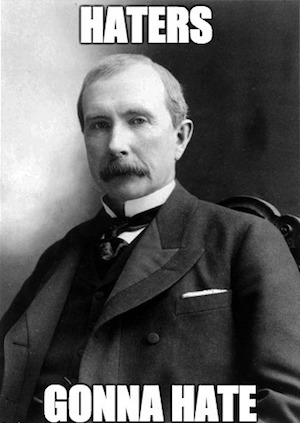
Rockefeller: Haters Gonna Hate
Some people get discouraged and feel insecure when they face harsh criticism. For other people, like Rockefeller, the haters are the fuel for success.
I took that page straight out of Rockefeller’s playbook. That’s why I pin all my hate mail on a wall:
#71 – Who Made These Rules Anyway?
Successful people don’t accept the defaults in their lives:
You have to go to college. Get married. Buy a house…
Who makes these rule anyway?
Adam Grant writes the following In his book Originals: How Non-Conformists Move the World:
When we become curious about the dissatisfying defaults in our world, we begin to recognize that most of them have social origins: Rules and systems were created by people. And that awareness gives us the courage to contemplate how we can change them.
Thinking like a leader means questioning the status quo.
This goes hand-in-hand with the next secret to success:
#72 – Never Worry About Other People’s Opinions
Do you ever feel like everyone’s watching your every move?
And worse…
Judging you by all your mistakes?
The truth is:
Yes, some people will always judge you… No matter what you do. They say, you can’t please everyone – it’s 100% true. Stop trying!
Here are the 5 best tips to help you stop worrying about what other people think…
…because other people’s opinions is one thing successful people DON’T worry about.
#73 – Rejection Is Part of the Game
Wildly successful people get rejected like everyone else.
Or at least, they did.
The difference is:
They didn’t give up.
There are literally 1000’s of reasons why somebody may say “no” to you.
So, you really shouldn’t take it personal. There are actually a bunch of rejection letters to now-famous people floating around the interwebs…
One of my favorites is this one:
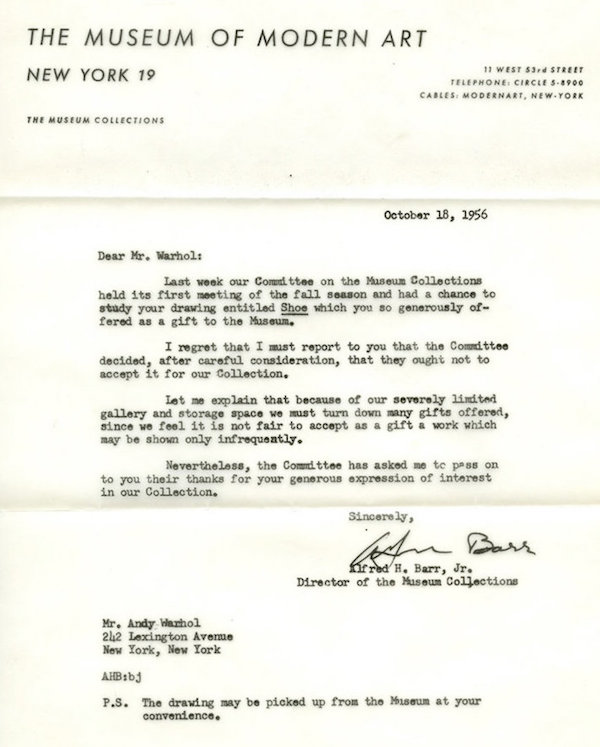
MOMA said “No” to Andy Warhol.
The Museum of Modern Art (MOMA) sent it to Andy Warhol. They didn’t even send him back his drawing! He had to go pick it up. Ugh.
Oh well…
Today, MOMA has 100’s of Andy Warhol’s works in its collection.
#74 – People Are the Same Wherever You Go
It’s astounding how predictable we humans are!
Actually, that’s the reason I called this website Social Triggers…
There are certain things you can do or say, and I can almost guarantee how people will react. Don’t believe me? Go tell someone they’re ugly and let me know how it goes.
Robert Greene lists seven deadly realities. They are (each with a short explanation):
- Envy – It is in our nature to constantly compare ourselves to others.
- Conformism – Members of any group will adopt the same values.
- Rigidity – We prefer to stick with what is simple and familiar.
- Self-obsessiveness – We think first and foremost of ourselves.
- Laziness – People love shortcuts.
- Flightiness – People quickly change their minds based on current emotions.
- Passive Aggression – Most people try to avoid direct confrontation.
Maybe some of these traits are unflattering. So what? It doesn’t make them untrue. You don’t need to be a psychology major to get a grasp on them either…
But successful people understand human psychology better than most – and use it to their advantage.
#75 – Incentives Make the World Go ‘Round
In Think Like a Freak, Steven D. Levitt and Stephen J. Dubner write:
If there is one mantra a freak lives by, it is this: people respond to incentives. As utterly obvious as this point may seem, we are amazed at how frequently people forget it, and how often it leads to their undoing.
The tricky part is figuring out what people really want.
The problem is:
What people SAY they want is not always what they really want (see #11).
So what really motivates people?
Is it money. Is it the greater good? Is it fitting in with the crowd? Or standing out?
Unfortunately, the answer is: It depends.
But the point remains:
Successful people use incentives to create win-win situations – to their own and and everyone else’s advantage.
#76 – It’s Not What You Know, It’s Who You Know
You know what they say about clichés, right?
It’s a cliché because it’s true.
An influential network is important if you want to succeed.
The problem with networking is… Well, there are many problems.

This is the problem with business cards
The big one?
People don’t know how to introduce themselves the right way.
I wrote about it here.
#77 – What Goes Around Comes Around
One of the psychological rules successful people understand better than most is the rule of reciprocity.
It’s simple:
People tend to respond to a positive action with another positive action.
Think about it… When you give people a compliment, what happens? Most of the time they’ll respond by giving YOU a compliment back, right?
Right! People like to return favors.
This reciprocity can often carry over for years. That’s why the best networking tactics is as simple as this:
Help people with whatever they’re working on right now. If you can someone a favor today, chances are they’ll remember it if and when you ever ask for a favor in return.
Of course, it goes both ways. When you attack someone, their natural reaction is to get defensive – and fight back.
That’s the power of reciprocity.
#78 – Don’t Expect Any Favors
Successful people understand the Rule of Reciprocity…
…but they don’t necessarily see it as a “tactic.”
Often, it’s just how they operate.
In Adam Grant’s best-selling book Give and Take, he quotes the Roman emperor Marcus Aurelius:
“Some people, when they do someone a favor, are always looking for a chance to call it in. And some aren’t, but they’re still aware of it – still regard it as debt.
But others don’t even do that. They’re like a vine that produces grapes without looking for anything in return… after helping others… They just go on to something else… We should be like that.” – Marcus Aurelius
You might think the most successful people are the ones that only look out for themselves by cutting down others…
But Adam Grant makes a different case:
In the long-run, a basic approach of giving first – without expect that successful return – leads to success.
(However, It’s true that successful Givers have to screen out selfish Takers. Otherwise, they get taken advantage of.)
#79 – Never Lie, Cheat, or Steal
Not only because it’s wrong. It’s also dumb.
Warren Buffett once said:
It takes 20 years to build a reputation and five minutes to ruin it. If you think about that, you’ll do things differently.
That’s why if you want to succeed in the long run, you should never lie in business – or in life.
Remember this the next time you’re tempted to take an unethical shortcut.
#80 – Your Reputation is Everything
You have a reputation, whether you like it or not…
The point is:
The most successful people TAKE CONTROL of their reputation.
Why? Because success and power rely on it.
So…
Are you the unreliable friend, who tells a white lie when it suits him? Or are you the trustworthy guy, who always delivers on his promises?
Start taking control of your reputation.
(I talk about how I used this mindset to get promoted FAST in this blog post. I also talk about the most important lesson I learned building a million dollar business after 10 years of failure.)
Part 5: How Successful People Think About Living Life to the Fullest
Remember, you can also see all the lessons in this infographic. If you like these lessons, please share it!
What is success?
In the end, it’s up to you.
I believe it’s about living life to the fullest.
So, how do some of the most successful people manage to live without regrets?
#81 – No Excuses
The biggest lie we tell ourselves is that we don’t have TIME.
The truth is:
Successful people make time for the things that matter. Now I know what you’re thinking. “But I have kids” or “But I already have 2 jobs” or WHATEVER.
But rather than thinking about why you can’t do something… how about you start thinking about HOW you CAN do it?
I talked about this mindset in on of my recent vlogs (I post a new video EVERY SINGLE DAY, so make sure you subscribe to my YouTube channel):
#82 – Take 100% Responsibility
Successful people don’t make excuses. Instead…
They take 100% responsibility.
It’s tempting to only take credit for your success and blame everyone else when things go wrong. But that’s not how successful people think.
They don’t blame other people. Instead, they ask themselves: “What could I have done differently?”
I got this “100% responsibility” mindset from one of my favorite business figures of all time, J. Paul Getty. He wrote the following in his autobiography, As I See It:
“I submit that the successful businessman must and does take the responsibility for his actions. It is the mediocrities and the outright failures who blame everyone and everything but themselves for whatever goes wrong. That is why they are mediocrities or failures.”
#83 Memento Mori (“Remember that you will die.”)
It’s may seem crude, but it’s still true:
You’re gonna die.
Memento Mori is Latin for “Remember that you will die”. It’s a foundational principle of Stoic philosophy. Does it mean you should live as if today was your last day?
No…
What it means is that you should live your life “as if you’re not sure whether your time on this earth is ending or not,” as Ryan Holiday writes.
It means: Make the most of life. Keep your sh*t in order. Stop wasting time and do what you can do today.
Because tomorrow isn’t promised.
#84 Opinions Must Be Challenged – Especially Your Own
You’ll often hear that successful people are “independent” thinkers. That they think “for themselves.” But what does that really mean?
To think independently, first you have to take in more than one point of view. Only then can you form your own opinion.
It’s hard because we tend to live in social media echo chambers these days…
One distraction I’ve learned to avoid is consuming media that’s just telling me things I already know and agree with. – Julia Galef in Tribe of Mentors
Validating what you already know feels good. But it doesn’t help you think independently.
That’s why successful people always challenge their own beliefs.
#85 – “I’m Not special”
Successful people don’t think they’re special.
Gary Vaynerchuk writes in Crushing It!:
You have no reason to start acting like something special until you actually have something special to show for it. Even then, don’t act special; the moment you do, you’ll start moving in the opposite direction. Take my advice: Eat shit for as long as you have to.
For many people, this is a tough one to get their head around.
Why?
Because we’re literally conditioned to believe that we are, indeed, special:
We’re told that we’re “too smart,” “too hard-working,” or “too kind” to fail. It’s all code for “You’re special.”
This kind of thinking can only lead to an entitled attitude. But…
#86 – Entitlement is for Losers
“You are only entitled to the action, never to its fruits.” —Bhagavad Gita
Sorry, but no one owes you anything.
Because successful people don’t think they’re special, they don’t feel entitled. So, they’re not shocked and offended when they don’t get what they want, either.
No…
Successful people don’t think they’re entitled to success. They know they have to earn it – like everyone else.
#87 – Never Complain
Next time you want to complain about something, imagine there was no one around to listen.
Would you still complain?
No, you’d probably get back to work.
That’s exactly how successful people think:
“Complaining is the absolute worst possible thing you could do for your health or your wealth” – T Harv Eker in Secrets of the Millionaire Mind
Complainers attract other complainers. So they can be miserable and complain together.
#88 – Discipline Equals Freedom
In Tribe of Mentors former Navy SEAL Jocko Willink says:
You want more free time? Follow a more disciplined time-management system. You want financial freedom? Implement long-term financial discipline in your life.
The truth is:
Everyone wants freedom. But not everyone is willing to do what it takes to get it. The only way to get it, says Jocko, is discipline.
Discipline seems like the opposite of freedom. But as it turns out, Jocko’s right. Studies show that self-discipline is a better predictor of success than IQ.
That’s good news. It means successful people aren’t smarter than the rest. They’re just more disciplined.
(Btw – I’m putting my own discipline to the test. I’m creating a new, helpful video every day.)
#89 Don’t Wait for Permission
One of my favorite entrepreneurs is Andrew Carnegie. There’s one story in particular that changed the way I think about the world.
Carnegie, at the time, was a morse-code operator for the Pennsylvania Railroad company. One day he got a critical message – a train had fallen off the track. The people on-site didn’t know what to do. The problem? Carnegie’s boss was nowhere to be found either.
Here’s what Carnegie did…
He ran some numbers. Then he sent back this message:
“Burn the train.”
Now think about this. He was just a morse code operator. And – without asking anyone’s permission – he gave the instruction to BURN A TRAIN.
As it turns out, it was the right decision. Burning the train was, in fact, the cheapest solution.
So what’s the lesson here?
Successful people don’t wait for permission.
When it’s time to act, they act.
If you make the wrong call, you can always ask for forgiveness later.
#90 – Books Are Amazing
Buying a book is one of the best deals on the planet. Think about it. What’s the worst that could happen when you buy a book?
You “lose” $20 or so. But really you didn’t lose at all. Because now you know what you don’t agree with. So, the downside of buying a book is negligible. On the upside, you may just learn a lesson that will change your life for the better, forever.
That’s why books are amazing and buying a book is never a bad investment.
“The genuine love for reading itself, when cultivated, is a superpower.” – Naval Ravikant
I got obsessed with reading when I was about 8 years old, trying to learn chess. Ever since then, I’ve been an avid reader.
Now, I’m not a fan of the typical business books. Instead, I love reading biographies. I made a video where I share my favorite types of books to read – watch it here.
#91 – It’s Okay to Be Weird
I always say:
What blends in gets ignored. What stands out gets remembered.
And yes, I just quoted myself.
But it’s okay. Because being weird and owning your quirks is a key to success.
The truth is: Everyone’s weird about some things.
I write on expensive paper for no reason. I know a guy whose favorite thing in the world is baking bread. And I’m sure you have your quirks, too…
Your quirks are what make you, well, you. And if you want to be remembered, you need to own your weirdness.
#92 – Don’t Take Yourself So D*mn Seriously
What’s the point of being “successful” if you’re miserable the whole time?
“Fun is one of the most important — and underrated — ingredients in any successful venture. If you’re not having fun, then it’s probably time to call it quits and try something else.” – Richard Branson
The key here is to not take yourself so freakin’ serious. Because “when you try hard that’s when you die hard.”
#93 – The Obstacle is the Way
“The Obstacle is the Way” is another principle of Stoicism. My friend Ryan Holiday even wrote a great book about it.
The Greek philosopher Epictetus captures the essence of this mindset like this:
“It’s not what happens to you, but how you react to it that matters.”
Because there’s always another obstacle. That’s just life. Physics professor Janna Levin, one of the world’s leading cosmologists, explains this perfectly in Tribe of Mentors:
I used to resent obstacles along the path, thinking, ‘If only that hadn’t happened, life would be so good.’ Then I suddenly realized, life IS the obstacles. There is no underlying path.
#94 Face the Truth (Even When it Hurts)
Do you ever say something you don’t really mean because you don’t want to hurt someone’s feelings? Successful people are not afraid of the truth… even when it hurts.
Billionaire hedge fund founder Ray Dalio goes even further. Dalio believes radical transparency is the only way to build a company where the best ideas win.
#95 The Right Choice is the Hard Choice
Hard choices, easy life. Easy choices, hard life.
Successful people are successful because they’re able to make the hard choices.
How?
One of the smartest ways I know is the 10-10-10 rule by Suzy Welch.
Here’s how it works.
Whenever you need to make a tough decision, ask yourself…
- How will I feel about it in 10 minutes?
- How will I feel about it in 10 months?
- How will I feel about it in 10 years?
I’ve used this rule many times. It works. Often it brings instant clarity, and you’ll know what the right choice is.
Successful people know how to make hard choices. The 10-10-10 rule is a good way to get started.
#96 – The Future Can Be Better Than the Present
My friend Lewis Howes is a former athlete turned successful entrepreneur. He’s also an irredeemable optimist:
Almost every successful person begins with two beliefs:
1. The future can be better than the present.
2. I have the power to make it so.
— Lewis Howes (@LewisHowes) December 24, 2017
Optimism + Confidence = Success.
If there’s a formula for success, it must look something like that.
#97 – “I Can Do This”
Successful people know what they don’t know.
At the same time, they trust in their own capabilities.
Maybe a little bit too much…
This tweet from best-selling writer Neil Strauss sums it up nicely:
One of the keys to lasting success is having a realistic or *slightly* inflated assessment of your own abilities and a realistic or *slightly* deflated assessment of your own knowledge.
So, being slightly over-confident is probably a good thing because…
#98 – Competence Breeds Confidence (Which Leads to Success)
Are confident people more successful? Or are successful people more confident?
The answer is… both.
Because true confidence means:
- Believing that you deserve to succeed
- Believing that you have the abilities to succeed
Success and confidence go hand in hand.
So, how do you become more confident?
10 years ago, when I was just starting college, I would have said, “There is no secret. You either have it or you don’t.”
And I would have been WRONG.
To build my confidence, at first, I had to fake it. Today I want to tattoo “UNSTOPPABLE” on my forehead.
#99 – Things Are Never as Bad or as Good as They Seem
Just because they’re confident and optimistic doesn’t mean successful people are delusional…
Before Tony Hsieh became the CEO of Zappos, he sold LinkExchange to Microsoft for a cool $265 million.
One of my favorite quotes from his book is…
Things are never as bad or as good as they seem.
Catastrophic thinking won’t get you far. But neither will blind optimism.
So, to be successful, don’t assume the best – or the worst.
#100 – “Everything is Figure-Out-Able”
This is what my friend Marie Forleo’s mother told her as a kid.
And it’s so true. If you go through life and see nothing but problems – reasons why things won’t work out – you won’t get very far.
Instead, shift your perspective and always look for the solution. Because, yes, everything is figure-out-able.
Marie gives a wonderful talk about it here.
#101 – Be the Exception
Finally…
My own #1 rule of success is this:
To Your Success!
If you found a useful life lesson in this article, please share it. Thanks!
Click on the image to share it on Facebook:









Interesting, The #70 Haters gonna Hate. When i knew my haters hate me then i started loving them. that made my haters hate even more. LOL
loved this, powerful and inspiring!
Thanks Derek, I enjoyed your article very much. Part 2 – #40 spoke to me personally – I will take the advice on board. Cheers, Ludij.